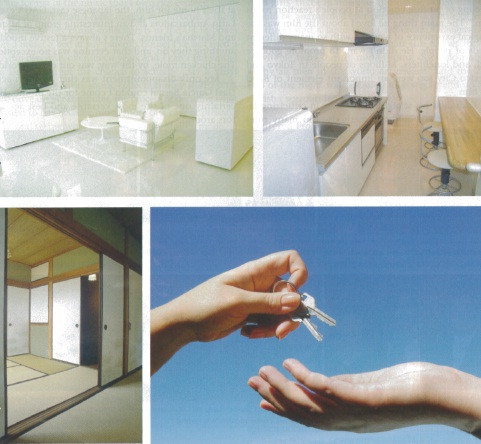From making the move to saying goodbye
by Danielle Tate-Stratton
Moving from one side of the city to the other can be a daunting task for a family, whether or not it involves new schools and jobs. Simply finding the best grocery stores and places to play in a new neighborhood can be a challenge, not to mention boxing up all of those ‘must-have’ possessions that once seemed so important to you—Absizer-3000, anyone? Moving to a whole new continent provides its own unique set of additional challenges. For an expat, moving to Japan generally means moving thousands of miles away from friends and family, to a country with a language you or your family may not be able to understand, a new culture, new schools, and perhaps, a new job. To help you prepare, we’ve spoken to several experts and put together a guide to relocation and moving in Japan.
The first thing to keep in mind in all aspects of your move and stay here is to plan ahead as far as possible. All of the relocation companies we spoke to requested that you give them as much warning as possible (ideally two months). Louis Pimentel, of Crown Relocations (www.crownrelo.com), suggests that you start planning your move six months ahead of time.
While your relocation company can help you with the logistics and should be able to provide you with a checklist of things to do before you move, if you have children, make sure you give yourself plenty of time to find a suitable school, especially if there are siblings. Louis says that often a family will decide on a school, and then discover that there is space for only one sibling, leaving the family with more challenging decisions to make. So, if you have more than one child and you want them to attend the same school, plan early and plan a lot! To get you started on your search for the perfect International school, visit http://tinyurl.com/2do7ux for detailed local listings.
Crown has moved, among other things:
dismantled houses, sailboats, koi,
and an entire tree-house
Of course, for detailed advice and help moving those unusual objects (Crown has moved, among other things: dismantled houses, sailboats, koi, and an entire tree-house), contact a relocation agency, or have your company put you in touch with their preferred agents.
Once you get to Japan, the fun of looking for an apartment or house begins! Likely, you will make a trip here before you move in order to find a place. If your company doesn’t provide or administer housing you will have more freedom in the area and type of house you might chose to live in (expat housing is overwhelmingly located in a few central neighborhoods). Louis says that for some people, this is perfect as more English services in the vicinity make them feel more comfortable. However, for some, the idea of moving to Japan is an adventure, and they want to experience it to the fullest, branching out to more traditional neighborhoods and looking for houses with tatami rooms and other Japanese touches.
Lisa, who relocated to Tokyo from the US about 18 months ago due to her husband’s job, concurs: “Try and read up on the different neighborhoods to get a feel for which area would best suit your needs. Also make a list of things that are important to you…it can be a very overwhelming experience, so being prepared can help ease the moving pains.” Lisa and her husband were aided in their relocation through their husband’s company, and chose to take full advantage of the real estate agent provided by their relocation company. “Finding an apartment here was much easier in some cases (as opposed to in the US) because the relocation company provided a real estate agent that took us around on a two day city-wide apartment tour. The agent we received was very helpful, if a bit over enthusiastic, and we must have looked at literally over twenty places in two days before finding the place we decided to move into. It was nice that he was so helpful and honest about the pros and cons of each area.”
Andrew Stevens, of H&R Consultants (www.hrconslt.com), a comprehensive home relocation and real estate company, describes the steps to finding and moving into an apartment, a process that, all told, takes six weeks at the minimum. At the beginning, you will generally come to Japan for a short trip, called a look-see, to decide whether or not you want to accept your company’s offer of relocation/reassignment. Following that, there is another short trip, called the home-finding tour, which, as was Lisa’s experience, can be a whirlwind.
Typically, clients view eight to ten properties in one day, and then chose three to revisit on subsequent days. The average clients find their residences within five days, although Andrew has had clients view 100 properties without success! Once someone decides on a home they typically return to their home country to tie up loose ends and pack, while H&R Consultants handles the contracts and legalities, a process that takes around one month. This way, once you are ready to move, your apartment should be ready and waiting for you.
For anyone staying under a year, H&R Consultants generally places people in serviced apartments. A kind of hotel-apartment hybrid, these are great for short-term stays, as you don’t need to pay any penalties on un-completed leases (in general, you should expect a minimum lease to be one year, and the penalty for exiting early to be in the neighborhood of one month’s rent). Cheaper than a hotel, a serviced apartment still provides many amenities such as a concierge, high quality furnishings, and the conveniences of your kitchen and laundry facilities. Visit ICHII Corporation (www.japt.co.jp) to get an idea of what a serviced apartment might look like or include.
If you know you will be settling here for a long time, and want to be more permanently settled, con-sider buying a property. It is only recently that foreigners have been allowed to purchase property in Japan, and although possible, it is by no means easy to do so. Plan to work with an experienced company (H&R recommends KEN Corporation or Plaza Homes). For those who have permanent residency status, or are married to a Japanese national, obtaining a home loan is much easier, otherwise, brace yourself for lots and lots of paperwork!
For instance, Shinsei Bank, renowned for being foreigner-friendly, requires your last two years’ income and tax statements, the purchase contract, foreign registration cards, and application forms. The bank will also perform an appraisal on the land and lower the loan amount or refuse you altogether if they find fault with the property. For non-Permanent Residents, Shinsei will require you to take out a second mortgage on the property until you become a permanent resident.
If you want to have a look at what is available be-fore you bring a real estate agent on board, head to www.japanhomesearch.com, a subsidiary of H&R Consultants, and one of the most comprehensive listing services on the internet. In English, and updated daily, it’s a great place to start looking for your perfect home or apartment.
Once you move in, it can be hard to create the feeling of ‘home’, especially if you are only here for a short amount of time, and don’t want to invest a lot of money into furniture. For those who won’t be able to move all of their possessions to Japan, chose only a few pieces that you can’t live without—Andrew suggests you bring some easily portable artwork and purchase or lease the rest of your requirements once here. H&R Consultants provides a leasing service that can outfit your home with everything you might want or need—right down to a grand piano!
Of course, there are plenty of opportunities to pick up items once you get to Japan, from IKEA to Muji for the basics, to much more unique shopping opportunities. Although it might not seem like your assignment is very long, Geeta Mehta Ph.D, AIA, of Braden and Mehta ([email protected]), reminds people that: “A three-year assignment can actually be five percent of your adult life and should be treated with importance.” She goes on to say that, “Living in Tokyo is a great chance to reinvent yourself. If you have a house in your home country that is full of heavy antiques this may be a great opportunity to try a light, contemporary interior… Don’t hesitate to be bold and use colors and furniture in unusual ways that excite you.”
While the limitations in terms of how much you can bring to Japan may, at the outset, appear to be a drawback, Mehta sees this as a benefit, “Most expats enjoy de-cluttering their homes and their lives. Chances are you too will enjoy the feeling of space and peace of mind that this can bring.”
If you are coming towards the end of your stay, it will be time to start thinking about packing up those new treasures and relocating back to your home country. One of the biggest challenges can be getting rid of extra possessions. If the proliferation of sayonara sales in magazines and bulletin boards geared towards expats is any indication—the supply of used couches and cupboards far outweighs the demand. Andrew Olea of Asian Tigers (www.asiantigers-japan.com) suggests looking into recycle shops which can come pick up your goods, and depending on the quality, may even pay you a little bit for some pieces (on the other hand, you may also need to pay some removal costs if the pieces are damaged or older).
One innovative way that Asian Tigers helps families deal with excess at the end of their stay is through a partnership with Second Harvest Japan (www.2hj.org/index.php/eng_home), where left over foodstuffs can be picked up and donated to the charity.
As with coming to Japan, Olea says most companies need about two months notice, and says that two to three estimates should give you a good idea about the market. Unless you have any particularly tricky items (authentic samurai swords, for instance, require a police escort to the airport), leaving Japan is fairly simple, just make sure to de-register your residency at your local ward office, or, as Olea points out, you could be slapped with a hefty tax fee should you return to Japan.
Although moving to and eventually from Japan can seem overwhelming, there are plenty of English-speaking experts here in Tokyo to make the process easier. Even if it seems as though your family might present a particularly tricky case, don’t worry—these companies have probably dealt with a more unusual one—for instance, Asian Tigers recently handled luggage transport for the King and Queen of Sweden, here on a royal visit!









